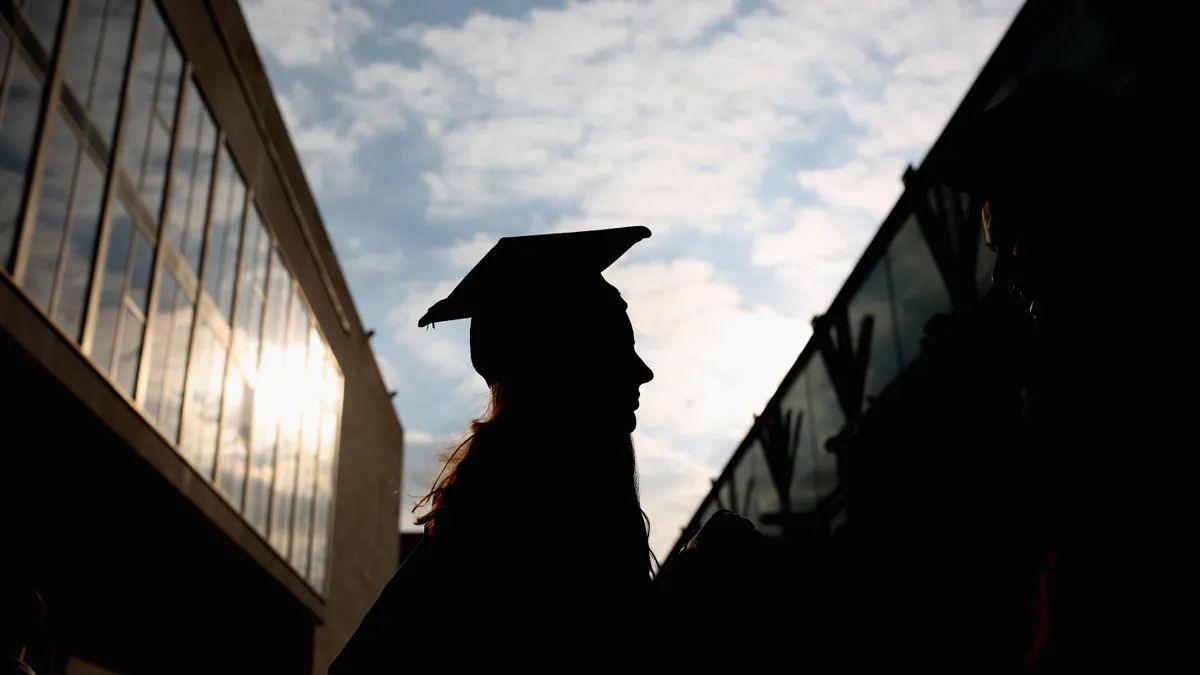Dive Brief:
- A new survey of nearly 1,000 unauthorized immigrant students who completed undergraduate degrees reveals the obstacles they face post-graduation, including barriers that impede their ability to find work or enroll in graduate programs.
- TheDream.US, a scholarship and advocacy organization for unauthorized immigrant students, polled 998 of its alumni in February and March of this year. While 85% of the graduates said they had jobs, a lack of access to occupational licenses prevented some from working in their chosen occupations.
- More than half of alumni said they were interested in graduate school. But just 17% said they were able to enroll in a program and complete their degree, with many citing finances as a major hurdle.
Dive Insight:
The report casts light on how unauthorized immigrant students are faring in the workplace and graduate school as two major events unfold affecting this population. One is the ongoing coronavirus crisis, which has hit the employment levels of foreign-born workers harder than those of native-born workers in the U.S. And the other is the presidency of Joe Biden, whose proposed policies are much friendlier toward unauthorized students than actions under former President Donald Trump.
Trump took steps to end the Deferred Action for Childhood Arrivals program, which allows immigrants brought illegally to the U.S. as children to study and work with temporary protection from deportation as long as they renew with the program every two years. One of Biden's first actions as president was to sign an executive order to preserve DACA.
Nearly nine in 10 of the surveyed students said they are protected under DACA.
But the program is still in flux. A federal judge signed an order this summer blocking the Department of Homeland Security from approving new DACA applications.
TheDream.US is advocating for a permanent pathway to citizenship for unauthorized immigrants.
"This consistent need to renew DACA every two years for those who have it poses a constant reminder of their temporary status," said Hyein Lee, director of measurement and evaluations at TheDream.US.
Many unauthorized students graduating from high school today are no longer eligible for DACA because they arrived in the country after the program's cutoff of June 15, 2007, Lee said.
The findings also reveal which careers TheDream.US alumni are pursuing. Nearly one-third were employed in the public and social services field. About one-fifth were employed in business, and similar shares were employed in either health and medicine fields or science, math and technology fields. Overall, three-fourths of polled graduates said they are working in essential or frontline jobs.
Graduates reported varying levels of access to occupational licensure, which is required for many workers including teachers, nurses, lawyers and accountants. While federal law restricts states from extending licensure to unauthorized immigrants, five states have passed legislation opting out of these restrictions. Another 12 have statutes extending licensure in specific professions to immigrants with DACA protection.
Of the surveyed graduates whose occupations required licensure, 56% had obtained it while 44% had not.
Licensure has a major impact on students' earnings potential. More than half of those with professional licenses were earning over $50,000 each year, while only 29% of those without licenses could say the same.
"It's a very telling narrative of how, you know, inequity in state laws really hinders the social mobility of our college graduates," Lee said.
The results also draw attention to the challenges unauthorized students face when applying to graduate school. Unauthorized immigrants are not eligible for federal student loans or most private loans. Moreover, state aid and tuition policies are often murky for these students at the graduate level, according to the report.
The report recommends that Congress extend federal financial aid to unauthorized students and colleges provide resources to help this group apply to graduate school.














